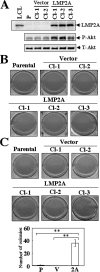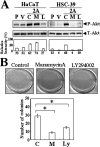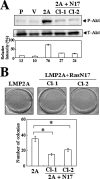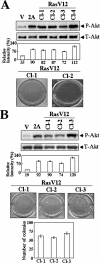Epstein-Barr virus latent membrane protein 2A mediates transformation through constitutive activation of the Ras/PI3-K/Akt Pathway
- PMID: 17582000
- PMCID: PMC1951437
- DOI: 10.1128/JVI.00537-07
Epstein-Barr virus latent membrane protein 2A mediates transformation through constitutive activation of the Ras/PI3-K/Akt Pathway
Abstract
Epstein-Barr virus (EBV) latent membrane protein 2A (LMP2A) is widely expressed in EBV-infected cells within the infected human host and EBV-associated malignancies, suggesting that LMP2A is important for EBV latency, persistence, and EBV-associated tumorigenesis. Previously, we demonstrated that LMP2A provides an antiapoptotic signal through the activation of phosphatidylinositol 3-kinase (PI3-K)/Akt pathway in vitro. However, the exact function of LMP2A in tumor progression is not well understood. In this study, we found that LMP2A did not induce anchorage-independent cell growth in a human keratinocyte cell line, HaCaT, but did in a human gastric carcinoma cell line, HSC-39. In addition, LMP2A activated the PI3-K/Akt pathway in both HaCaT and HSC-39 cells; however, LMP2A did not activate Ras in HaCaT cells but did in HSC-39 cells. Furthermore, the Ras inhibitors manumycin A and a dominant-negative form of Ras (RasN17) and the PI3-K inhibitor LY294002 blocked LMP2A-mediated Akt phosphorylation and anchorage-independent cell growth in HSC-39 cells. These results suggest that constitutive activation of the Ras/PI3-K/Akt pathway by LMP2A is a key factor for LMP2A-mediated transformation.
Figures






References
-
- Barbacid, M. 1987. ras genes. Annu. Rev. Biochem. 56:779-827. - PubMed
-
- Bell, A. I., K. Groves, G. L. Kelly, D. Croom-Carter, E. Hui, A. T. Chan, and A. B. Rickinson. 2006. Analysis of Epstein-Barr virus latent gene expression in endemic Burkitt's lymphoma and nasopharyngeal carcinoma tumour cells by using quantitative real-time PCR assays. J. Gen. Virol. 87:2885-2890. - PubMed
-
- Boukamp, P., E. J. Stanbridge, D. Y. Foo, P. A. Cerutti, and N. E. Fusenig. 1990. c-Ha-ras oncogene expression in immortalized human keratinocytes (HaCaT) alters growth potential in vivo but lacks correlation with malignancy. Cancer Res. 50:2840-2847. - PubMed
-
- Breitkreutz, D., P. Boukamp, C. M. Ryle, H. J. Stark, D. R. Roop, and N. E. Fusenig. 1991. Epidermal morphogenesis and keratin expression in c-Ha-ras-transfected tumorigenic clones of the human HaCaT cell line. Cancer Res. 51:4402-4409. - PubMed
Publication types
MeSH terms
Substances
Grants and funding
LinkOut - more resources
Full Text Sources
Other Literature Sources

